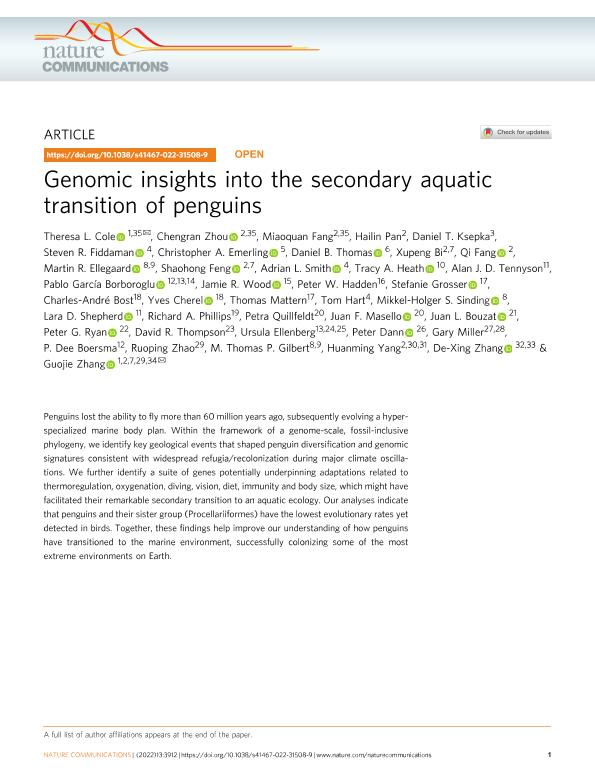Artículo
Genomic insights into the secondary aquatic transition of penguins
Cole, Theresa L.; Zhou, Chengran; Fang, Miaoquan; Pan, Hailin; Ksepka, Daniel T.; Fiddaman, Steven R.; Emerling, Christopher A.; Thomas, Daniel B.; Bi, Xupeng; Fang, Qi; Ellegaard, Martin R.; Feng, Shaohong; Smith, Adrian L.; Heath, Tracy A.; Tennyson, Alan J. D.; Garcia Borboroglu, Jorge Pablo ; Wood, Jamie R.; Hadden, Peter W.; Grosser, Stefanie; Bost, Charles-André; Cherel, Yves; Mattern, Thomas; Hart, Tom; Sinding, Mikkel-Holger S.; Shepherd, Lara D.; Phillips, Richard A.; Quillfeldt, Petra; Masello, Juan F.; Bouzat, Juan L.; Ryan, Peter G.; Thompson, David R.; Ellenberg, Ursula; Dann, Peter; Miller, Gary; Boersma, P. Dee; Zhao, Ruoping; Gilbert, M. Thomas P.; Yang, Huanming; Zhang, De-Xing; Zhang, Guojie
; Wood, Jamie R.; Hadden, Peter W.; Grosser, Stefanie; Bost, Charles-André; Cherel, Yves; Mattern, Thomas; Hart, Tom; Sinding, Mikkel-Holger S.; Shepherd, Lara D.; Phillips, Richard A.; Quillfeldt, Petra; Masello, Juan F.; Bouzat, Juan L.; Ryan, Peter G.; Thompson, David R.; Ellenberg, Ursula; Dann, Peter; Miller, Gary; Boersma, P. Dee; Zhao, Ruoping; Gilbert, M. Thomas P.; Yang, Huanming; Zhang, De-Xing; Zhang, Guojie
 ; Wood, Jamie R.; Hadden, Peter W.; Grosser, Stefanie; Bost, Charles-André; Cherel, Yves; Mattern, Thomas; Hart, Tom; Sinding, Mikkel-Holger S.; Shepherd, Lara D.; Phillips, Richard A.; Quillfeldt, Petra; Masello, Juan F.; Bouzat, Juan L.; Ryan, Peter G.; Thompson, David R.; Ellenberg, Ursula; Dann, Peter; Miller, Gary; Boersma, P. Dee; Zhao, Ruoping; Gilbert, M. Thomas P.; Yang, Huanming; Zhang, De-Xing; Zhang, Guojie
; Wood, Jamie R.; Hadden, Peter W.; Grosser, Stefanie; Bost, Charles-André; Cherel, Yves; Mattern, Thomas; Hart, Tom; Sinding, Mikkel-Holger S.; Shepherd, Lara D.; Phillips, Richard A.; Quillfeldt, Petra; Masello, Juan F.; Bouzat, Juan L.; Ryan, Peter G.; Thompson, David R.; Ellenberg, Ursula; Dann, Peter; Miller, Gary; Boersma, P. Dee; Zhao, Ruoping; Gilbert, M. Thomas P.; Yang, Huanming; Zhang, De-Xing; Zhang, Guojie
Fecha de publicación:
12/2022
Editorial:
Nature
Revista:
Nature Communications
ISSN:
2041-1723
Idioma:
Inglés
Tipo de recurso:
Artículo publicado
Clasificación temática:
Resumen
Penguins lost the ability to fly more than 60 million years ago, subsequently evolving a hyper-specialized marine body plan. Within the framework of a genome-scale, fossil-inclusive phylogeny, we identify key geological events that shaped penguin diversification and genomic signatures consistent with widespread refugia/recolonization during major climate oscillations. We further identify a suite of genes potentially underpinning adaptations related to thermoregulation, oxygenation, diving, vision, diet, immunity and body size, which might have facilitated their remarkable secondary transition to an aquatic ecology. Our analyses indicate that penguins and their sister group (Procellariiformes) have the lowest evolutionary rates yet detected in birds. Together, these findings help improve our understanding of how penguins have transitioned to the marine environment, successfully colonizing some of the most extreme environments on Earth.
Palabras clave:
PENGUINS
,
ORIGIN
,
EVOLUTION
,
ADAPTATION
,
GENOMICS
Archivos asociados
Licencia
Identificadores
Colecciones
Articulos(CESIMAR)
Articulos de CENTRO PARA EL ESTUDIO DE SISTEMAS MARINOS
Articulos de CENTRO PARA EL ESTUDIO DE SISTEMAS MARINOS
Citación
Cole, Theresa L.; Zhou, Chengran; Fang, Miaoquan; Pan, Hailin; Ksepka, Daniel T.; et al.; Genomic insights into the secondary aquatic transition of penguins; Nature; Nature Communications; 13; 1; 12-2022; 1-13
Compartir
Altmétricas



